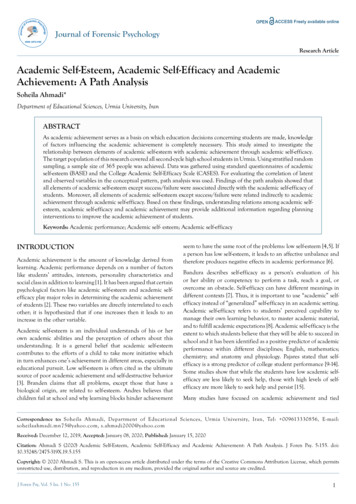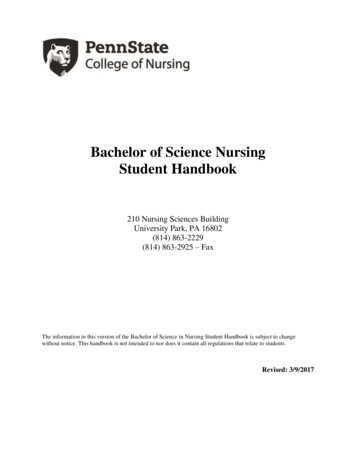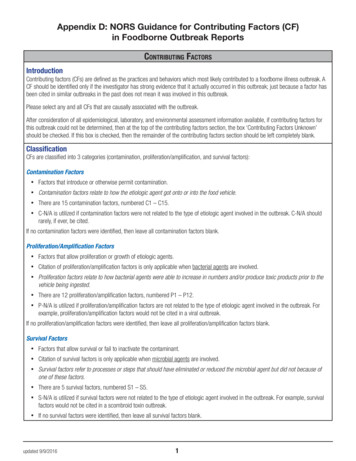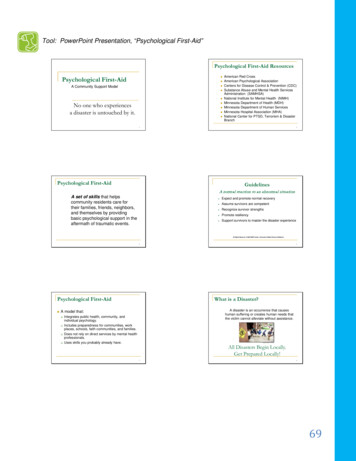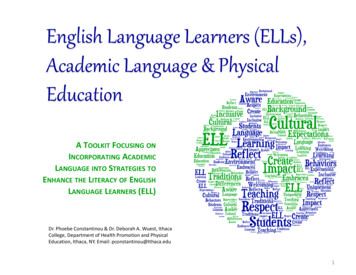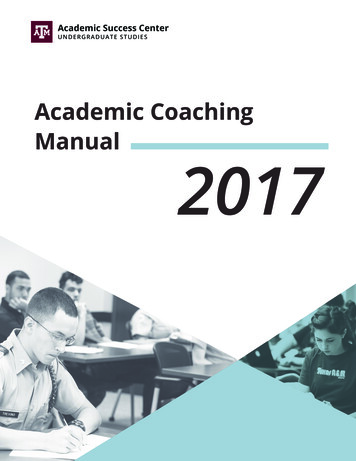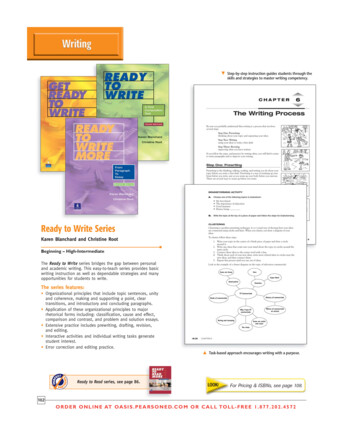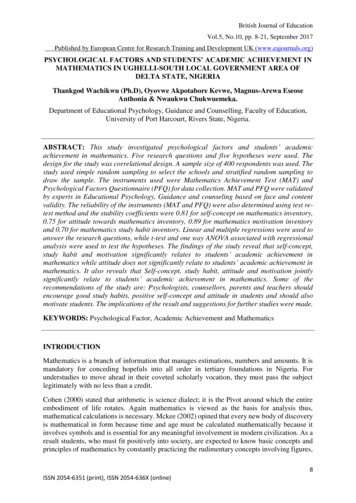
Transcription
British Journal of EducationVol.5, No.10, pp. 8-21, September 2017Published by European Centre for Research Training and Development UK (www.eajournals.org)PSYCHOLOGICAL FACTORS AND STUDENTS’ ACADEMIC ACHIEVEMENT INMATHEMATICS IN UGHELLI-SOUTH LOCAL GOVERNMENT AREA OFDELTA STATE, NIGERIAThankgod Wachikwu (Ph.D), Oyovwe Akpotabore Kevwe, Magnus-Arewa EseoseAnthonia & Nwaukwu Chukwuemeka.Department of Educational Psychology, Guidance and Counselling, Faculty of Education,University of Port Harcourt, Rivers State, Nigeria.ABSTRACT: This study investigated psychological factors and students’ academicachievement in mathematics. Five research questions and five hypotheses were used. Thedesign for the study was correlational design. A sample size of 400 respondents was used. Thestudy used simple random sampling to select the schools and stratified random sampling todraw the sample. The instruments used were Mathematics Achievement Test (MAT) andPsychological Factors Questionnaire (PFQ) for data collection. MAT and PFQ were validatedby experts in Educational Psychology, Guidance and counseling based on face and contentvalidity. The reliability of the instruments (MAT and PFQ) were also determined using test retest method and the stability coefficients were 0.81 for self-concept on mathematics inventory,0.75 for attitude towards mathematics inventory, 0.89 for mathematics motivation inventoryand 0.70 for mathematics study habit inventory. Linear and multiple regressions were used toanswer the research questions, while t-test and one way ANOVA associated with regressionalanalysis were used to test the hypotheses. The findings of the study reveal that self-concept,study habit and motivation significantly relates to students’ academic achievement inmathematics while attitude does not significantly relate to students’ academic achievement inmathematics. It also reveals that Self-concept, study habit, attitude and motivation jointlysignificantly relate to students’ academic achievement in mathematics. Some of therecommendations of the study are: Psychologists, counsellors, parents and teachers shouldencourage good study habits, positive self-concept and attitude in students and should alsomotivate students. The implications of the result and suggestions for further studies were made.KEYWORDS: Psychological Factor, Academic Achievement and MathematicsINTRODUCTIONMathematics is a branch of information that manages estimations, numbers and amounts. It ismandatory for conceding hopefuls into all order in tertiary foundations in Nigeria. Forunderstudies to move ahead in their coveted scholarly vocation, they must pass the subjectlegitimately with no less than a credit.Cohen (2000) stated that arithmetic is science dialect; it is the Pivot around which the entireembodiment of life rotates. Again mathematics is viewed as the basis for analysis thus,mathematical calculations is necessary. Mckee (2002) opined that every new body of discoveryis mathematical in form because time and age must be calculated mathematically because itinvolves symbols and is essential for any meaningful involvement in modern civilization. As aresult students, who must fit positively into society, are expected to know basic concepts andprinciples of mathematics by constantly practicing the rudimentary concepts involving figures,8ISSN 2054-6351 (print), ISSN 2054-636X (online)
British Journal of EducationVol.5, No.10, pp. 8-21, September 2017Published by European Centre for Research Training and Development UK (www.eajournals.org)especially in areas of factorization, like and unlike terms, simultaneous equation, quadraticequation and word problem in mathematics, as their usefulness is relevant in everyday dealings.As a result, the subject must be grasped by rebuilding the self-idea, study propensity andaccomplishment inspiration state of mind of young people towards how they perceiveMathematics.According to Benson (2000) for transactions in buying and selling to succeed, ones abilitiesmust be tuned to a point that he understands mathematical symbols and calculations. This hebelieves will eliminate cheating amongst the parties involved to large extent that is whylearner’s negative self-concept, attitude, achievement motivation and poor attitude towardsmathematics should be restructured to reduce or eliminate the phobia associated with learningmathematical. It is because of how important mathematics is that it has been made compulsoryand a pre-requisite subjects that science and arts students must pass at O level so as to gainadmitted into the university. This is s strategy the Nigerian government use to makemathematics popular. To enhance mathematics learning among the students’ in secondaryschools is necessary as it brings about national progress and development would be adverselyaffected (Okoye, 2006).As regards school subjects, the irrational belief that some school subjects are hard tocomprehend begins to register in the students’ subconscious, because of the societal beliefs.Probably, this could be the motivation behind why most understudies don't accomplish thefancied goal in mathematics. Gal (2000) emphasized that some contributing factors to students’lack of mathematics achievement are poor study habit and attitude towards the subject whichis as a result of fear and the general impression created by the society, who believe thatmathematics is difficult to comprehend.According to Stone (2003) students do not learn automatically, they need guidance anddirection before real interest is developed, eventually leading to effective learning. Somedevice ways sought by guidance counselors include; reconstructing study habit, self-concept,motivation and attitude to encourage the students, who have unconsciously developed a phobiaand re-address their mind with positive statement such as, “I will understand mathematics, if 1practice the concepts regularly”.According to Oyserman (2001) self-concept also relates to self-cognition, which means thatindividuals could interpret experiences such that it can affect their judgments and reactionstowards academics. He stated that there are two types of self-concept which include academicself-concept which is the perception about personal academic abilities affecting particularlymathematics areas and the non-academic self-concept which includes the perception formedby individuals about his behaviour in the emotional, social and physical field. Again, Mckee(2002) opines that there is growing evidence in the students’ negative attitude and belief aboutmathematics and that, through various teaching and learning styles, adopted by guidancecounselors to aid students understanding, by making the students talk to themselves positively,the student’s positive attitude and self-esteem becomes actualized.According to Gargus (2002), when students encourage themselves with positive self-talk, onissues or areas that have been a burden to them, they tend to increase their level ofdetermination to succeed, in that particular area of interest.9ISSN 2054-6351 (print), ISSN 2054-636X (online)
British Journal of EducationVol.5, No.10, pp. 8-21, September 2017Published by European Centre for Research Training and Development UK (www.eajournals.org)This helps the student to attain the aspired level to achieve success. Kochhar (2000) viewsstudy habit as important in assisting students with certain challenges in mathematics and alsoto help defective methods of hearing and poor motivation.Achievement according to Dahir and Stone (2003) is gotten by the acquisition of skills andusing these acquired skills to the best of the individual’s abilities and capabilities to enhancehis/her performance in life. Bandura (1997) stated that, people’s personal expectations forachievement is important in enhancing their desire to succeed. For instance, if you believe thatyour effort at studying will result in good grade in your examination, you will be inspired tostudy. This belief helps to mobilize the individuals’ energy in performing a lot better. This iswhy students, who constantly solve mathematics problems, with a mind-set to achieve successwill excel.According to Mangal (1998), when ones’ achievement in a desired field is attained, life isfulfilling. The desire to achieve success he believes is as basic and natural as other biologicalneeds, such as oxygen, which is essential for survival including psychosocial needs, which isneeded for self-actualization. Also in Darling-Hammond (2002) view, peoples’ aspiration toattain success helps people to succeed, particularly in their area of interest. However Davis(2001) believes that, the imbibed phobia for mathematics sometimes affects students’performance, to higher achievement levels, even if it’s obvious that a good grasp of the subjectwould enable them gain admission into higher educational bodies. The term academicachievement has been described as the scholastic standing of a student at a given moment. Itrefers to how an individual is able to demonstrate his or her intellectual abilities (Opara &Nwaukwu, 2016). Based on this background, the present researcher was committed toinvestigate self-concept, study habit, attitude and motivation and its relationship to students’Academic achievement in mathematics.Observation and report from examination bodies Uncovered that high rate of students insecondary schools perform poorly in mathematics examinations. Presently, poor performancein mathematics in Delta State has made many students drop out of school. Therefore, therequired credit needed in the subject which is a compulsory prerequisite to gaining admissioninto any Nigerian tertiary institution is not achieved by the student. Failure in mathematics iscould be caused by the concept one has about him or herself, habits in studying and motivationand attitude of students. Students’ still generate great anxiety for the subject such that makesthem run away from mathematics lessons. Students’ negative attitude toward mathematics andtheir poor study habit makes them have little or no confidence in themselves. Poor performancetrend in mathematics could affect student’s achievement motivation and lead to students’creating an unconscious fear to the subject and this might invariably hamper students’accomplishment level in the pursuit of mathematics academic brilliance. As a result Of theobvious effect of this mathematics phobia in students, it becomes necessary to investigate whythis trend consistently exists among students’. This study seeks to examine those degree/ extentto which self-concept, study habit, attitude and motivation relate to students’ academicachievement in mathematics in Ughelli-South LGA of Delta State.These research questions were formed as a guide to this study.1.2.To what extent does self-concept relate to student’s academic achievement inmathematics in Ughelli-South LGA of Delta State?To what extent does study habit relate to student’s academic achievement inmathematics in Ughelli-South LGA of Delta State?10ISSN 2054-6351 (print), ISSN 2054-636X (online)
British Journal of EducationVol.5, No.10, pp. 8-21, September 2017Published by European Centre for Research Training and Development UK (www.eajournals.org)3.4.5.To what extent does attitude relate to student’s academic achievement in mathematicsin Ughelli-South LGA of Delta State?To what extent does motivation relate to student’s academic achievement inmathematics in Ughelli-South LGA of Delta State?To what extent does self – concept, study habit, attitude and motivation jointly relate tostudent’s academic achievement in mathematics in Ughelli-South LGA of Delta State?The following null hypotheses which was tested at 0.05 level of significance guided1. Self-concept does not significantly relate to students’ academic achievement inmathematics in Ughelli-South LGA of Delta State.2. Study habit does not significantly relate to students’ academic achievement inmathematics in Ughelli-South LGA of Delta State.3. Attitude does not significantly relate to students’ academic achievement in mathematicsin Ughelli-South LGA of Delta State.4. Motivation does not significantly relate to students’ academic achievement inmathematics in Ughelli-South LGA of Delta State.5. Self-concept, study habit, attitude and motivation do not have any significant combinerelationship with students’ academic achievement in mathematics in Ughelli-SouthLGA of Delta State.METHODOLOGYIn this study, Correlational design was used because it involves finding out if there is significantcorrelation between a dependent and independent variables. Correlational design is defined byKpolovie (2010) as the type of study adopted for investigation of the magnitude and directionor nature of relationship that exist between a dependent variable (criterion variable) and one ormore independent variables (predictor variables). According to Nworgu (1991) definedcorrelational design as the type of study that prove the relationship that exists between two ormore variables. This design was used to find out if there is any relationship between selfconcept, study habit, attitude and as well as motivation of students as they relate to academicachievement in mathematics.The population of the study comprised of all senior secondary two (SSII) students in thetwenty-four (24) secondary schools in Ughelli-South Local Government Area of Delta Statemanaged by state education commission (S.E.C). Senior secondary two (SSII) studentsnumbering 3,120 (three thousand one hundred and twenty) in 2014/2015 academic sessionformed the population for this study. (Source: State Educational Commission HeadquartersAsaba, 2015).A sample of 400 senior secondary two students [SSII] was used for the study. The researcherused simple random sampling technique via balloting to draw 6 secondary schools from 24secondary schools in Ughelli-South L.G.A. Then stratified random sampling technique wasused to draw 400 senior secondary two students [SSII] from the population of 3,120 seniorsecondary two students from Ughelli-south L.G.A.This study made use of two instruments. They are “Psychological Factor Questionnaire” (PFQ)and “Mathematics Achievement Test” (MAT). The two instruments (PFQ and MAT) weredeveloped by the researcher. The “Psychological Factors Questionnaire” (PFQ) consists of four11ISSN 2054-6351 (print), ISSN 2054-636X (online)
British Journal of EducationVol.5, No.10, pp. 8-21, September 2017Published by European Centre for Research Training and Development UK (www.eajournals.org)subsection which focus on self-concept, study habit, attitude and Motivation of studentstowards mathematics academic achievement. The questionnaire is made-up of four-point likertscale which require the students to indicate the level of agreement or disagreement with theitems, thus, strongly agree (SA), Agree (A), Disagree (D) and strongly disagree (SD) was used.The independent variables are positively and negatively keyed with each subsection having 10items making a total of forty (40) items.The mathematics achievement test (MAT) contains fifty items comprising of simultaneousequation, quadratic equation, word problem in algebra, factorization and like/Unlike terms.These topics cover the present SSII first term syllabus of 2014 approved by the FederalMinistry of Education. The points awarded to (PFQ) items will be arranged in the descendingorder of magnitude with the exception of the negative statements which will be handled inreverse thus, positive items have 4,3,2,1 for strongly Agree (SA), Agree (A), Disagree (D), andstrongly Disagree (SD). Based on this, the total score for each respondent on these variables:self-concept, study habit, attitude as well as motivation will be gotten by adding the scores ofeach respondent on each variable separately. Finally, the total score of the independent variablewill be correlated with the total score of the dependent variable.The instrument was constructed and given to three experts in the field of educationalpsychology for vetting and assessment of the suitability of the content of the questionnaire toensure face validity and the instrument was finally modified by integrating into the worksuggestions given by the experts. Their suggestions were that the questionnaire should reflectthe variables under review. This procedure was followed so that their judgments were used todetermine the validity of the instrument. This instrument was ascertained to possess contentvalidity since items measured the variables under study.Reliability of this instruments was determined through test-retest method. Simple randomtechnique was used to draw a sample of 30 students for the reliability test. Copies of theinstrument were administered to a similar group but not the same group for the study. After aninterval of two weeks, the same instruments were administered to the same sample and theirresponses were scored. The initial and re-tested scores were correlated using Pearson ProductMoment. The stability coefficient is 0.81 for self-concept on mathematics achievementinventory, 0.75 for attitude towards mathematics inventory, 0.89 for mathematics motivationinventory and lastly 0.70 for mathematics study habit inventory. The coefficient value soobtained is highly sufficient to guarantee the use of the instrument as a reliable one for thestudy. Copies of the questionnaires were administered to the respondent in their various schoolsby the researcher and were closely monitored for the completion and return of the instruments.Linear and multiple regression was utilized to proffer solution to the research questions whilet-test and one way Analysis of variance (ANOVA) associated with the regressional analysisused to test the hypotheses at 0.05 alpha levels.RESULTS/FINDINGSResearch Question 1: To what extent does self-concept relate to students’ academicachievement in mathematics in Ughelli-South LGA of Delta State?Hypothesis1:Self-concept does not significantly relate to students’ academic achievement inmathematics in Ughelli-South LGA of Delta State.12ISSN 2054-6351 (print), ISSN 2054-636X (online)
British Journal of EducationVol.5, No.10, pp. 8-21, September 2017Published by European Centre for Research Training and Development UK (www.eajournals.org)In order to answer the research question linear regression was used while in testing the nullhypothesis, t-test associated with regression was employed.Table 4.: Linear regression analysis of the relationship between self-concept and students’academic achievement in mathematics.ModelR2R0.1150.013Adjusted oefficientsStd 22Significant(RejectHo)The result in table 4.1 showed linear regression analysis of the relationship between selfconcept and student academic achievement in mathematics. The linear regression yielded acoefficient of 0.115 while R2 is 0.013. This means that self-concept had a low relationship withstudent academic achievement in mathematics. Based on the R2 value of 0.013, it indicates thatthe relationship of self-concept only explains 1.3% of the variation in student academicachievement in mathematics.To determine if the relationship is significant or not, t-test associated with regression wasemployed. The beta value -0.115 is significant based on its t-value of -2.304 was significant at0.022 level, which is lesser than the chosen probability level of 0.05. (B -0.115, t -2.304,p 0.05). Hence the null hypothesis is rejected. This implies that self-concept significantlyrelates to students’ academic achievement in mathematics in Ughelli-South LGA of DeltaState.Research Question 2: To what extent does study habit relate to students’ academicachievement in mathematics in Ughelli-South LGA of Delta State?Hypothesis 2: Study habit does not significantly relate to students’ academic achievement inmathematics in Ughelli-South LGA of Delta State.In order to answer the research question linear regression was used while in testing the nullhypothesis, t-test associated with regression was employed.13ISSN 2054-6351 (print), ISSN 2054-636X (online)
British Journal of EducationVol.5, No.10, pp. 8-21, September 2017Published by European Centre for Research Training and Development UK (www.eajournals.org)Table 4: Linear regression analysis of the relationship between study habit and students’academic achievements in t0.0000.000Significant(Reject Ho)The result in table 4.2 showed linear regression analysis of the relationship between study habitand students’ academic achievement in mathematics. The linear regression yielded acoefficient of 0.216 while R2 is 0.047. This means that study habit had a low relationship withstudents’ academic achievement in mathematics. Based on the R2 value of 0.047, it indicatesthat the relationship of study habit only explains 4.7% of the variations in students’ academicachievement mathematics. To determine if the relationship is significant or not, t – testassociated with regression was employed. The beta value of -0.216 is significant based on itst-value of -4.416 was significant at 0.000 level, which is lesser than the chosen probability levelof 0.05. (B -0.216, t - 4.416, p 0.05). Hence, the null hypothesis is rejected. This impliesthat study habit significantly relate to students’ academic achievement in mathematics.Research Question 3:To what extent does attitude relate to students’ academic achievement in mathematics inUghelli-South LGA of Delta State?Hypothesis 3: Attitude does not significantly related to students’ academic achievement inmathematics in Ughelli-South LGA of Delta State.In order to answer the research question linear regression was used while testing the nullhypothesis t-test associate with regression was employed.14ISSN 2054-6351 (print), ISSN 2054-636X (online)
British Journal of EducationVol.5, No.10, pp. 8-21, September 2017Published by European Centre for Research Training and Development UK (www.eajournals.org)Table 4.: Linear regression analysis of the relationship between attitude and students’academic achievement in 0000.449Not Sig(AcceptedHo)The result in table 4.3 showed linear regression analysis of the relationship between attitudeand students’ academic achievement in mathematics. The linear regression yielded acoefficient of 0.038 while R2 is 0.001. This means with attitude had a low relationship withstudent’s academic achievement in mathematics. Based on the R2 value of 0.001 it indicate thatthe relationship of attitude only explain 0.1% of the variations in students’ academicachievement in mathematics. To determine if the relationship is significant or not, t-testassociated with regression was employed. The beta value of -0.038 is not significant based onits t-value of -0.759 that is not significant at 0.449 level, which is greater than the chosenprobability level of 0.05 (B -0.038, t 0.759, p 0.05). Therefore the null hypothesis isaccepted. This implies that attitude does not significantly relate with students’ academicachievement in mathematics.Research Question 4: To what extent does motivation relate to students’ academicachievement in mathematics in Ughelli-South LGA of Delta State?Hypothesis 4: Motivation does not significantly relate to students’ academic achievement inmathematics in Ughelli-South LGA of Delta State.In order to answer the research question linear regression was used while testing the nullhypothesis t-test associated with regression was employed.15ISSN 2054-6351 (print), ISSN 2054-636X (online)
British Journal of EducationVol.5, No.10, pp. 8-21, September 2017Published by European Centre for Research Training and Development UK (www.eajournals.org)Table 4: Linear regression analysis of the relationship between motivation and students’academic achievement in sult0.0000.033Significant(Reject Ho)The result in table 4.4 showed linear regression analysis of the relationship between motivationand students’ academic achievement in mathematics. The linear regression yielded 0.107 whileR2 is 0.011. This means that motivation had a low relationship with students’ academicachievement in mathematics. Based on the R2 value of 0.011. It indicate that the relationshipof motivation only explain 1.1% of the variation in students mathematics academicachievement.To determine if the relationship is significant or not, t-test associated with regression wasemployed. The beta value of 0.107 is significant based on its t-values of 2.143 was significantat 0.033 level, which is lesser than the chosen probability level of 0.005 (B 0.107, t 2.143,p 0.05). Hence the null hypothesis is rejected. This implies that motivation significantly relateto students’ academic achievement in mathematics in Ughelli-South LGA of Delta State.Research Question 5: To what extent does self-concept, study habit, attitude and motivationjointly relate to students’ academic achievement in mathematics in Ughelli-South LGA ofDelta State?Hypothesis 5: Self-concept, study habit, attitude and motivation do not have any significantcombine relationship with students’ academic achievement in mathematics in Ughelli-SouthLGA of Delta State.16ISSN 2054-6351 (print), ISSN 2054-636X (online)
British Journal of EducationVol.5, No.10, pp. 8-21, September 2017Published by European Centre for Research Training and Development UK (www.eajournals.org)Table 4.5 multiple regression analysis of the joint relationship between self-concept studyhabit, attitude and motivation and students’ academic achievement in mathematics.ModelR0.277Analysis ofSum of 240.305Depend variable: students’ academic achievement in mathematicPredictor variable: self-concept, study habit, attitude and motivation.The result in table 4.5 showed multiple regression analysis of the joint relationship betweenself-concept, study habit, attitude and motivation and students’ academic achievement inmathematics. The multiple regression coefficient obtained is 0.277 while the R2 is 0.077 itindicates that the joint relationship of the four independent variables will only explain 7.7% ofthe variation in students’ academic achievement in mathematics. To determine if therelationship is significant or not, analysis of variance (ANOVA) associated with multipleregression was employed. The calculated F-value of 8.182 which is significant at 0.000 levelsis lesser than the chosen level probability of 0.05 F (4, 395) 8.182 and p 0.05. Hence, thenull hypothesis is rejected. This implies that self-concept, study habit, attitude and motivationjointly significantly relate to students’ academic achievement in mathematics.DISCUSSION OF RESULTSRelationship between Self-Concept and Students’ AcademicMathematics.Achievement inThe result of the research question shows that self-concept has a relationship with students’academic achievement in mathematics. The linear regression yielded a coefficient of 0.115while R2 is 0.013 (Table 4.1). The hypothesis stated that the beta value of -0.115 is significantbased on its t-value of -2.304 which was significant at 0.022 level, which is lesser than thechosen probability level of 0.05. Hence the null hypothesis is rejected. This implies that selfconcept significantly relate to students’ academic achievement in mathematics. The findingsof this study, is in agreement with those of Morita (2005) and Constantine (2009). Morita(2005) conducted a longitudinal study of self-concept in eight and tenth grade students andafter correlation of the first and second test after two years discovered that the students who17ISSN 2054-6351 (print), ISSN 2054-636X (online)
British Journal of EducationVol.5, No.10, pp. 8-21, September 2017Published by European Centre for Research Training and Development UK (www.eajournals.org)have negative self-concept show poor performance than the students with positive self-concept.Constantine (2009) reported that self-concept is related to academic performance because inhis study, students with positive self-concept were found to perform better in their academics.The present finding disagree with the findings of Stefano (2003) who asserted that self-conceptdoes not have significant relationship with academic achievement.Relationship between Study Habit and Students’ Academic Achievement in Mathematics.The result of the research question shows study habit had a relationship with students’academic achievement in mathematics. The linear regression yielded a coefficient of 0.216while R2 is 0.047 (Table 4.2). The hypothesis stated that the beta value of 0.216 is significantbased on its t-value of -4.416 which was significant at 0.000 level, which is lesser than thechosen probability level of 0.05. Therefore, the null hypothesis is rejected. This implies thatstudy habit significantly relate with students’ academic achievement in mathematics. Thefinding of this study is in agreement with the findings of Aluede and Onolenhemhen (2001)and Sirohi (2004) who asserted that good study habit bring about improvement in students’academic achievement. Sirohi found that study habit guidance program lead to better academicperformance. The present finding disagree
study habit and motivation significantly relates to students’ academic achievement in mathematics while attitude does not significantly relate to students’ academic achievement in mathematics. It also reveals that Self-concept, study habit, attitude and motivation jointly significantly relate to studen
